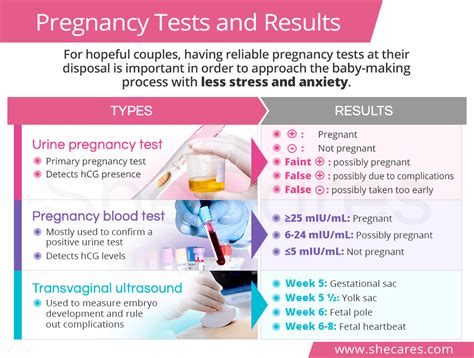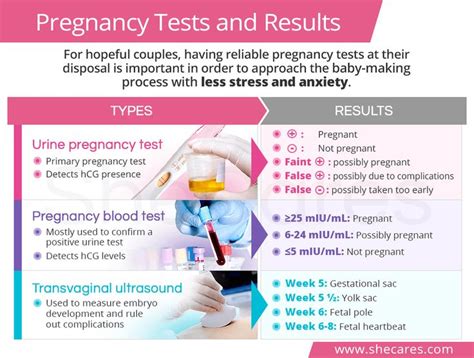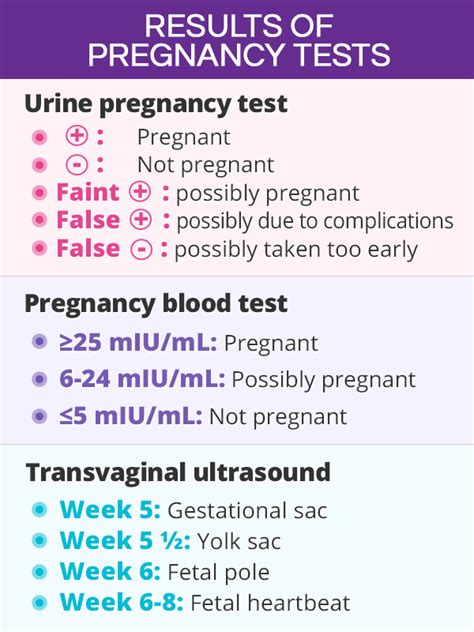Intro
Unlock the secrets of blood pregnancy test results, understanding hCG levels, and pregnancy confirmation through quantitative and qualitative tests, ensuring accurate maternity and paternity insights.
The anticipation of waiting for pregnancy test results can be overwhelming, especially for those trying to conceive. A blood pregnancy test, also known as a beta hCG test, is a diagnostic tool used to detect the presence of human chorionic gonadotropin (hCG) in the blood. hCG is a hormone produced by the placenta during pregnancy, and its levels can indicate the presence and progression of a pregnancy. Understanding blood pregnancy test results is crucial for individuals seeking to confirm a pregnancy or monitor its development.
The importance of blood pregnancy test results lies in their ability to provide accurate and early detection of pregnancy. Unlike home pregnancy tests, which detect hCG in urine, blood tests can detect the hormone at much lower levels, making them more sensitive and reliable. This is particularly significant for women experiencing symptoms of pregnancy, such as morning sickness or fatigue, who need confirmation of their condition. Additionally, blood tests can help identify potential complications early on, allowing for timely medical intervention.
For many individuals, the wait for blood pregnancy test results can be a nerve-wracking experience. The test itself involves a simple blood draw, usually from a vein in the arm, and the sample is then sent to a laboratory for analysis. The results are typically available within a few hours to a few days, depending on the laboratory and the testing facility. It is essential to understand that blood pregnancy test results can provide valuable insights into the health and progression of a pregnancy, and individuals should be prepared to discuss their results with their healthcare provider.
Understanding Blood Pregnancy Test Results

Blood pregnancy test results are typically reported in terms of the hCG levels detected in the blood. The results can be either qualitative (positive or negative) or quantitative (measuring the exact level of hCG). A positive result indicates the presence of hCG, confirming a pregnancy, while a negative result suggests that the hormone is not detectable. However, it is essential to note that very early pregnancies may not produce enough hCG to be detected, resulting in a false negative.
Quantitative results, on the other hand, provide a more detailed picture of the pregnancy. hCG levels typically double every 48 hours during the first trimester, and abnormal levels can indicate potential complications, such as ectopic pregnancy or miscarriage. Healthcare providers use these results to monitor the progression of the pregnancy and identify any potential issues early on.
Interpreting hCG Levels
Interpreting hCG levels requires careful consideration of various factors, including the gestational age of the pregnancy and the individual's overall health. hCG levels can vary significantly between pregnancies, and what may be considered a normal level for one person may be abnormal for another. Generally, hCG levels above 25 mIU/mL are considered positive for pregnancy, while levels below 5 mIU/mL are typically considered negative.However, it is crucial to remember that hCG levels are not the only indicator of a healthy pregnancy. Other factors, such as ultrasound results and the individual's symptoms, should also be taken into account. Healthcare providers use a combination of these factors to assess the health and progression of the pregnancy, making it essential to discuss the results with a qualified medical professional.
The Role of hCG in Pregnancy

hCG plays a crucial role in maintaining the pregnancy, particularly during the early stages. The hormone helps to sustain the corpus luteum, a temporary structure in the ovary that produces progesterone, a hormone essential for fetal development. hCG also stimulates the growth of the embryo and helps to develop the placenta, which provides oxygen and nutrients to the fetus.
Abnormal hCG levels can indicate potential complications, such as ectopic pregnancy, miscarriage, or chromosomal abnormalities. In these cases, healthcare providers may use additional tests, such as ultrasound or chorionic villus sampling, to confirm the diagnosis and develop a treatment plan.
hCG Levels and Pregnancy Complications
Monitoring hCG levels is essential for identifying potential complications early on. Abnormal levels can indicate a range of issues, including:- Ectopic pregnancy: hCG levels may be lower than expected, and the hormone may not be doubling at the expected rate.
- Miscarriage: hCG levels may be declining or not increasing at the expected rate.
- Chromosomal abnormalities: hCG levels may be higher or lower than expected, depending on the specific condition.
It is essential to note that hCG levels are only one indicator of a healthy pregnancy, and other factors, such as ultrasound results and the individual's symptoms, should also be taken into account.
Factors Affecting Blood Pregnancy Test Results

Several factors can affect blood pregnancy test results, including:
- Timing: hCG levels may not be detectable until 6-8 days after ovulation, and the hormone may not be present in sufficient quantities to produce a positive result until 10-14 days after conception.
- Sensitivity: different tests have varying levels of sensitivity, and some may detect hCG at lower levels than others.
- Interference: certain medications or medical conditions can interfere with the test results, producing false positives or false negatives.
It is essential to discuss any concerns or questions with a healthcare provider, who can provide guidance on the best course of action and help interpret the test results.
Common Medications Affecting hCG Levels
Certain medications can affect hCG levels, producing false positives or false negatives. These include:- Fertility medications: medications such as Clomid or gonadotropins can stimulate the production of hCG, leading to false positives.
- hCG supplements: taking hCG supplements can produce false positives, as the hormone is present in the blood.
- Certain antibiotics: some antibiotics, such as tetracycline, can interfere with the test results, producing false negatives.
Healthcare providers should be informed of any medications or supplements being taken, as this can affect the interpretation of the test results.
What to Expect After Receiving Blood Pregnancy Test Results

After receiving blood pregnancy test results, individuals can expect to discuss the findings with their healthcare provider. This discussion may include:
- Confirming the pregnancy: if the results are positive, the healthcare provider will confirm the pregnancy and provide guidance on the next steps.
- Monitoring the pregnancy: if the results indicate a potential complication, the healthcare provider may order additional tests or monitoring to assess the health of the pregnancy.
- Addressing concerns: individuals can discuss any concerns or questions they have with their healthcare provider, who can provide guidance and reassurance.
It is essential to remember that blood pregnancy test results are only one aspect of prenatal care. Regular check-ups and monitoring can help ensure a healthy pregnancy and identify any potential complications early on.
Follow-Up Care and Monitoring
Follow-up care and monitoring are crucial for ensuring a healthy pregnancy. This may include:- Regular check-ups: scheduled appointments with the healthcare provider to monitor the pregnancy and address any concerns.
- Ultrasound: imaging tests to monitor the growth and development of the fetus.
- Blood tests: additional blood tests to monitor hCG levels and assess the health of the pregnancy.
By working closely with their healthcare provider, individuals can ensure they receive the best possible care and support throughout their pregnancy.
Conclusion and Next Steps

In conclusion, blood pregnancy test results play a vital role in confirming and monitoring a pregnancy. Understanding the results and their implications can help individuals make informed decisions about their care and ensure the best possible outcomes. By working closely with their healthcare provider and following recommended guidelines, individuals can navigate the complexities of pregnancy with confidence and reassurance.
We invite readers to share their thoughts and experiences with blood pregnancy test results in the comments below. If you have any questions or concerns, please do not hesitate to reach out to your healthcare provider for guidance and support.
What is the purpose of a blood pregnancy test?
+A blood pregnancy test is used to detect the presence of human chorionic gonadotropin (hCG) in the blood, confirming a pregnancy and monitoring its progression.
How accurate are blood pregnancy test results?
+Blood pregnancy test results are highly accurate, with a sensitivity of 99% or higher. However, false positives or false negatives can occur due to various factors, such as medication or medical conditions.
What do abnormal hCG levels indicate?
+Abnormal hCG levels can indicate potential complications, such as ectopic pregnancy, miscarriage, or chromosomal abnormalities. Healthcare providers use these results to monitor the pregnancy and identify any potential issues early on.
